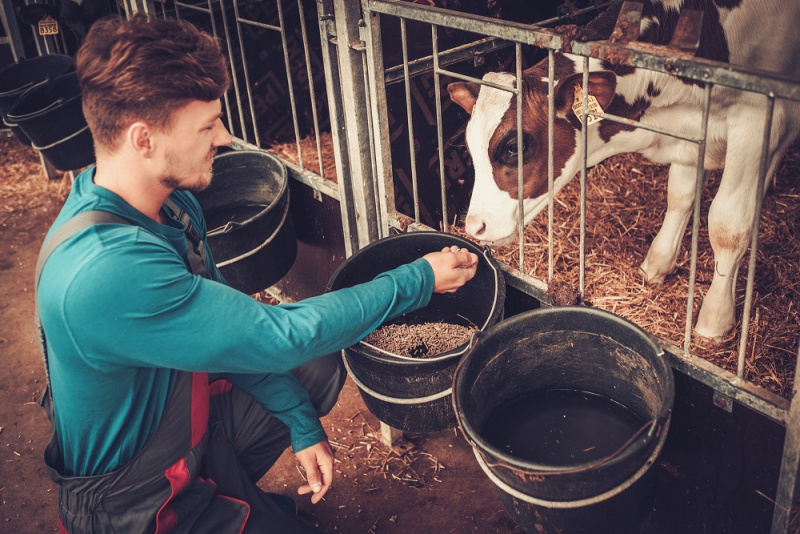
Importance of Feed Additives in Animal Nutrition
Just like in humans, animals require adequate nutrition in order to grow and thrive. The majority of animal feed foundations consist of basic raw materials like maize (for energy), soy (for protein) and a basic source of fat. These components lack the amount of nutrients necessary for optimal health and growth, and thus, feed additives are used to supplement them.
The Role of Feed Additives in Animal Nutrition
Feed additives not only supplement vitamins and minerals, they are also used to make the food more palatable to ensure that the animals continue eating them. They make the animal feed more easily digestible so as to avoid bowel stress and other digestion issues that can often occur in livestock.
Feed Additives in Animal Nutrition
There are typically eight different categories of animal feed additives that perform different functions. These are:
- Vitamins
- Minerals
- Amino Acids
- Binders
- Enzymes
- Antibiotics
- Acidifiers
- Antioxidants
Vitamins
There are typical vitamins that are added to animal feeds to make them more nutritional. Each one with its own specific role.
- A, retinol: for sight and epithelial tissues
- D3, cholecalciferol: for calcium absorption
- K, menadione: Prothrombin synthesis
- B1, thiamine: Carbohydrate and fat metabolism
- B2, riboflavin: Carbohydrate and amino acid metabolism
- Nicotinamide: Hydrogen transfer
- B6, pyridoxine: Amino acid metabolism
- Pantothenic acid: Acetate and fatty acid metabolism
- Folic acid: Metabolism of single carbon compounds
- Biotin: Carbon dioxide transfer
- Choline: Component of lecithin
- B12, cyanocobalamin: Propionate metabolism
- C, ascorbic acid: Oxidation/reduction reactions
Minerals
There are two types of minerals that need to be added to animal feed to ensure it is nutritional and well-balanced. Macro minerals are minerals that must be given in higher amounts. Micro minerals are only required in trace amounts.
Macro minerals include:
- Calcium: for bone and teeth health
- Phosphorus: metabolising energy as well as bone and teeth health
- Potassium: for bodily fluid regulation, nerves and muscle support
- Sodium: for fluid regulation
Micro minerals include:
- Iron: aids with blood synthesis
- Iodine: aids with thyroid hormone synthesis
- Copper: aids with blood synthesis
- Cobalt: Precursor to Vitamin B12
- Manganese: aids enzyme activation
- Zinc: enzyme component and activator
- Selenium: aids with iodine metabolism and immune function
Amino acids
Synthetic amino acids are typically added into animal feed. These include methionine, lysine, threonine and tryptophan. Amino acids act as the foundation for protein which is imperative for muscles, tissues, skin, hair, and more. Amino acids are vital for every living being to function.
There are additional additives that play a role in preventing the growth of harmful pathogens, assisting with the animal’s immune system, protects nutrients from breaking down, etc. These include:
- Antioxidants: to prevent nutritional deficiencies brought on by the destruction of vital vitamins and fats. They also play a role in protecting against free radicals that may result in certain cancers, heart disease, and more.
- Enzymes: used to supplement digestive enzymes in the animal’s stomach in order to break down (otherwise indigestible) feed. The enzymes also ensure that meat and egg production is improved.
- Mould inhibitors and mycotoxin binders: to prevent the growth of mould, and to stop any harmful mould from being absorbed into the gut and the bloodstream, which may result in severe health problems.
- Probiotics: used to balance bacteria levels in the stomach, and aid in digestion.
- Antibiotics: used for both the prevention and treatment of diseases, but also aiding in faster growth and size.
- Acidifiers: Used to aid in digestion and assist with the function of probiotics, acidifiers also assist with optimising the absorption of minerals, and improving the immune system.
In order to ensure that livestock are healthy, and produce sustainable, optimal human consumables, farmers and livestock managers must ensure that they are fed correctly and given the appropriate amount of water.
Properly balanced animal feed will ensure a sustainable business with less hiccups in the long-run.
To find the best sources of agricultural supplies and equipment, and animal feed additive suppliers of the highest quality, visit our directory and explore multiple sectors on one convenient platform.












